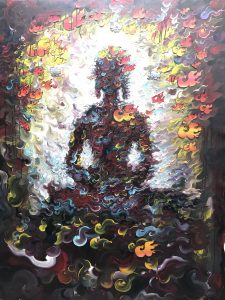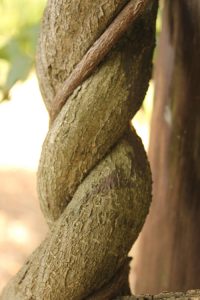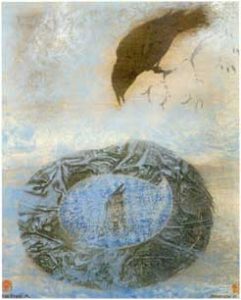 The Yogabliss on-line Moving into Meditation class met this morning. We shared a meditative inquiry about what is true for us in the present moment. True in the sense that we gradually become aware of what underlies the immediate sensations of tension, lethargy, energy, distraction – whatever registers in our awareness. As we stay with the present moment experience we can gradually tune into deeper feelings and underlying needs. We often stay on the surface of these inner waters which can reveal so much about our true selves. What really matters to us. Bringing compassionate awareness to our deep needs can be a bridge of empathy. We realize that we are all worthy of love and flourishing in life. This awareness and the tools of mindful listening can enable us to intuit the deeper feelings and needs of others. It can help us to better understand those we may disagree with. We are relational creatures who grow and learn with kindness.
The Yogabliss on-line Moving into Meditation class met this morning. We shared a meditative inquiry about what is true for us in the present moment. True in the sense that we gradually become aware of what underlies the immediate sensations of tension, lethargy, energy, distraction – whatever registers in our awareness. As we stay with the present moment experience we can gradually tune into deeper feelings and underlying needs. We often stay on the surface of these inner waters which can reveal so much about our true selves. What really matters to us. Bringing compassionate awareness to our deep needs can be a bridge of empathy. We realize that we are all worthy of love and flourishing in life. This awareness and the tools of mindful listening can enable us to intuit the deeper feelings and needs of others. It can help us to better understand those we may disagree with. We are relational creatures who grow and learn with kindness.
We  drew on the work of meditation instructor and non-violent communication trainer Oren Jay Sofer. You can find a number of his guided meditations at his web-site. We also listened to encouragement from meditation instructor and writer Sharon Salzberg. You can find her article, The Conscious Effort True Love Requires, in the column she writes for On Being with Krista Tippett. We closed with the beautiful poem, Kindness, by Naomi Shihab Nye.
drew on the work of meditation instructor and non-violent communication trainer Oren Jay Sofer. You can find a number of his guided meditations at his web-site. We also listened to encouragement from meditation instructor and writer Sharon Salzberg. You can find her article, The Conscious Effort True Love Requires, in the column she writes for On Being with Krista Tippett. We closed with the beautiful poem, Kindness, by Naomi Shihab Nye.
Relaxed Reflection
In our practice we have an opportunity to meet ourselves . . . to connect with what is real . . . In truly meeting ourselves we can hope to meet others, we can hope to meet the world. We can notice how we think of ourselves . . . how we think of ourselves is the seed from which we become ourselves . . . Right now we can reflect on this powerful truth . . . and how our thoughts inform what we say and do in the world. We can notice how we are – how we approach life – how we approach our meditation. This too conditions our minds. In his course on mindful communication Oren Jay Sofer advises:
 If you meditate with strain, struggle, impatience and tension, you’re reinforcing strain and struggle in your heart and mind. If you meditate with kindness, interest, patience and curiosity, you’ll strengthen those qualities in your heart and mind.
If you meditate with strain, struggle, impatience and tension, you’re reinforcing strain and struggle in your heart and mind. If you meditate with kindness, interest, patience and curiosity, you’ll strengthen those qualities in your heart and mind.
Can we bring curiosity and genuine interest to our practice? Can we meet what we discover with kindness? Do we have the courage to question what feels so true – what feels like home? What meaning will unfold in the inner space we hold with curiosity and genuine interest?
In her essay, The Conscious Effort True Love Requires, Sharon Salzberg writes:
. . . it’s clear that the mind is wired to find order. Habits make us feel safe. Judgments of those who are different than us make us feel protected. The stories we tell ourselves, really, are part of the armor we build to keep this order intact. A traumatic thing, be it big or small, happens to us, and then might come with us for the rest of our lives. We see our story as something that keeps us safe. But it also limits us. And we have many, many stories. These stories impact the ways we understand and experience love.
Sharon encourages meditation students “to examine and test the validity” of their stories and to “see that their stories, too, can be unstitched and rewoven – thousands or times.” In our practice we experience the truth of impermanence – the truth of life – things are ever changing – even who we think we are. Being willing to feel the pain and sometimes the relief in that truth helps us develop the compassion and wisdom we need in our relationships.
 Our willingness to see what we don’t want to see, feel what we don’t want to feel, hear what we don’t want to hear stretches our hearts and minds just a little bit more every time we manage to do it. This is effort, this is practice, this is an act of love. We start with what is true for us so that me might recognize the deeper truths of ourselves and others. We are better able to connect with what underlies another’s words and actions we tend to reflexively judge or reject. We can intuit another’s deeper feelings and needs that are seeking to be acknowledged and fulfilled.
Our willingness to see what we don’t want to see, feel what we don’t want to feel, hear what we don’t want to hear stretches our hearts and minds just a little bit more every time we manage to do it. This is effort, this is practice, this is an act of love. We start with what is true for us so that me might recognize the deeper truths of ourselves and others. We are better able to connect with what underlies another’s words and actions we tend to reflexively judge or reject. We can intuit another’s deeper feelings and needs that are seeking to be acknowledged and fulfilled.
Again and again we begin our practice with tuning into what is true. What we are feeling in the moment takes us to what we care about. What matters most to you right now? Take a moment to reflect on this . . . Tune into the deeper needs that might be alive for you. So many needs serve our well being in life . . . safety . . . trust . . . independence . . . joy . . . closeness . . . acceptance . . . to be seen, heard, understood . .. See if you can tune into what you want and express it as simply as you can . . . saying it silently, hearing it, it feeling it . . . shifting from thought to feeling as best you can . . . Honor what is important for you . . . let yourself meet this need as you would be meeting a friend . . . curious and open . . . Learn more about this friend and how this need is something that matters to everyone . . . You are not alone in this wanting. We have a heart that is so beautiful we can value our needs and let them connect us to our shared humanness.
Our deeper feelings and needs inhabit our hearts and they can’t live alone. As human beings we flourish in relationship. When we can recognize a bit of ourselves in another understanding begins to open our hearts. Sharon writes:
 The love we can cultivate for ourselves, which can unfurl as we practice challenging our habits, judgments, and assumptions (our stories, in other words), can open up a more expansive capacity for more love to come in, and to be sent out. We feel more whole, and less fragmented. We see that we are worthy of happiness, and that others are, too.
The love we can cultivate for ourselves, which can unfurl as we practice challenging our habits, judgments, and assumptions (our stories, in other words), can open up a more expansive capacity for more love to come in, and to be sent out. We feel more whole, and less fragmented. We see that we are worthy of happiness, and that others are, too.
Kindness Naomi Shihab Nye –
Before you know what kindness really is
you must lose things,
feel the future dissolve in a moment
like salt in a weakened broth.
What you held in your hand,
what you counted and carefully saved,
all this must go so you know
how desolate the landscape can be
between the regions of kindness.
How you ride and ride
thinking the bus will never stop,
the passengers eating maize and chicken
will stare out the window forever.
 Before you learn the tender gravity of kindness
Before you learn the tender gravity of kindness
you must travel where the Indian in a white poncho
lies dead by the side of the road.
You must see how this could be you,
how he too was someone
who journeyed through the night with plans
and the simple breath that kept him alive.
Before you know kindness as the deepest thing inside,
you must know sorrow as the other deepest thing.
You must wake up with sorrow.
You must speak to it till your voice
catches the thread of all sorrows
and you see the size of the cloth.
Then it is only kindness that makes sense anymore,
only kindness that ties your shoes
and sends you out into the day to gaze at bread,
only kindness that raises its head
from the crowd of the world to say
It is I you have been looking for,
and then goes with you everywhere
like a shadow or a friend.
